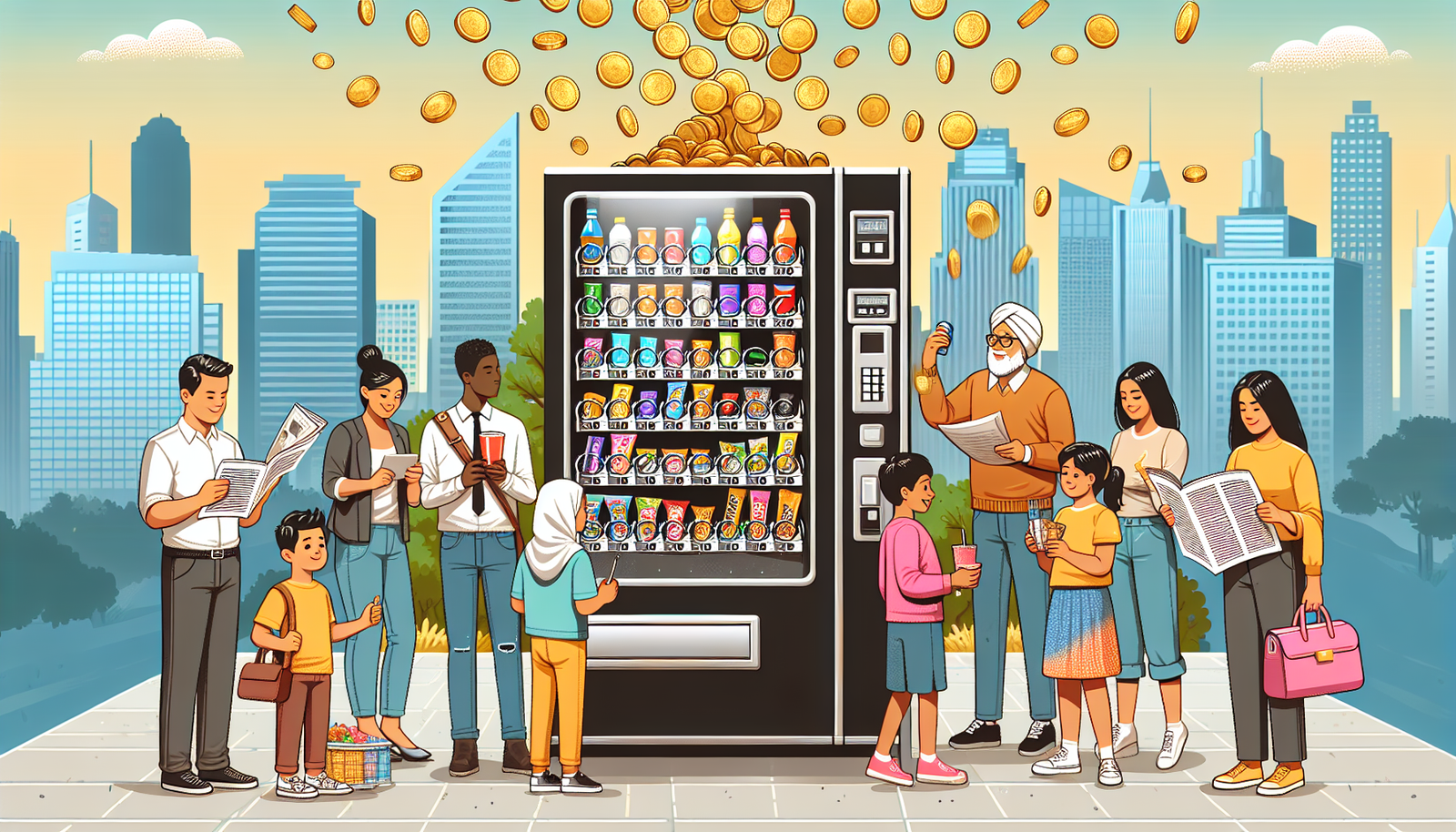The Vending Machine Business Revolution
The vending machine business represents a lucrative opportunity for entrepreneurs seeking passive income streams with relatively low overhead. This automated retail concept has evolved significantly from its humble beginnings, now offering sophisticated technology and diverse product options to meet modern consumer demands. For those considering this entrepreneurial path, understanding the industry's nuances can make the difference between marginal returns and substantial profits.
Evolution of Automated Retail
Vending machines have undergone a remarkable metamorphosis from simple mechanical devices to technologically advanced retail solutions. The contemporary vending landscape features machines equipped with touchscreens, cashless payment options, and even facial recognition technology. This evolution has expanded the potential locations and customer bases, creating unprecedented opportunities for savvy business operators.
The industry has transcended its traditional confines of dispensing merely snacks and beverages. Today's automated retail encompasses everything from electronics to fresh meals, catering to diverse consumer preferences in various environments. This versatility has propelled the vending machine business into a multibillion-dollar industry with robust growth projections.
Starting Your Vending Machine Enterprise
Launching a vending machine business requires strategic planning and careful consideration of various factors. The initial investment varies based on your chosen scale and equipment quality, but the barrier to entry remains lower than many other retail ventures. This accessibility makes it an attractive option for first-time entrepreneurs and seasoned business owners alike.
Initial Investment Considerations
Your startup costs will encompass machine acquisition, inventory stocking, location fees, and operational expenses. New machines typically range from $3,000 to $10,000, while refurbished options offer a more economical entry point at $1,000 to $4,000. Beyond equipment costs, allocate funds for transportation, maintenance, and a contingency reserve for unexpected expenditures.
When selecting your initial inventory, conduct thorough market research to understand consumer preferences in your target locations. This diligence will minimize product wastage and maximize return on investment. Many successful operators begin with 3-5 machines to establish processes before expanding their operations.
Maximizing Profitability Through Strategic Placement
Location selection constitutes perhaps the most crucial decision in the vending machine business. High-traffic areas with captive audiences offer the greatest potential for consistent sales. The ideal placement balances accessibility, security, and consumer demand.
Prime Location Opportunities
Office complexes provide dependable customer bases with employees seeking convenient refreshments throughout workdays. Educational institutions, particularly colleges and universities, offer dense populations of students needing quick sustenance between classes. Healthcare facilities operate round-the-clock, creating constant demand for vending services among staff, patients, and visitors.
When approaching potential location partners, present a professional proposal highlighting mutual benefits. Many property managers appreciate the enhanced amenity for their occupants while welcoming the supplementary income from commission arrangements. Negotiate terms carefully, considering factors like electricity costs, space requirements, and maintenance access.
Optimizing Your Machine Selection
The equipment you choose directly impacts operational efficiency and customer satisfaction. Modern vending machines offer diverse capabilities and configurations to meet specific business objectives and location requirements.
The Multi-Product Advantage
While specialized machines serve specific niches effectively, multi-product vending solutions offer exceptional versatility and revenue potential. These comprehensive units can dispense various product categories simultaneously, maximizing sales opportunities in single locations.
For businesses seeking optimal efficiency and profitability, Kolvending's high-capacity multi-product vending solution represents an exemplary investment. This advanced system accommodates snacks, beverages, and miscellaneous merchandise in one streamlined unit, eliminating the need for multiple machines in space-constrained environments.
The high-capacity design reduces restocking frequency, minimizing operational costs while maximizing sales potential. With sophisticated temperature control systems, these machines maintain appropriate conditions for diverse inventory, from refrigerated drinks to ambient snacks. This versatility empowers operators to test various product mixes and respond dynamically to consumption patterns.
Inventory Management Strategies
Effective inventory control directly impacts profitability in the vending machine business. Implementing systematic approaches to product selection, pricing, and restocking schedules optimizes cash flow and minimizes waste.
Data-Driven Product Selection
Modern vending operations leverage sales data to refine product offerings. Remote monitoring systems track purchase patterns, enabling operators to identify top performers and underperforming items. This analytical approach ensures machines contain merchandise aligned with consumer preferences at each specific location.
"The difference between profitable vending operations and struggling ones often comes down to inventory management. Operators who monitor product performance and adjust accordingly typically see 30-40% higher returns than those who maintain static offerings." - National Automatic Merchandising Association
Consider seasonal variations in consumer behavior when planning your inventory. Summer months typically drive increased beverage sales, while winter often boosts demand for hot drinks and heartier snacks. Anticipating these shifts allows proactive inventory adjustment to maximize sales opportunities.
Leveraging Technology for Operational Excellence
Technological advancements have revolutionized vending machine business operations. Embracing these innovations enhances efficiency, reduces costs, and improves customer experiences.
Remote Monitoring Systems
Telemetry solutions enable real-time visibility into machine status, inventory levels, and transaction data. These systems alert operators to maintenance needs and restocking requirements, optimizing service routes and eliminating unnecessary site visits. The resulting efficiency improvements can reduce operational costs by 15-25% while enhancing service quality.
Cashless payment capabilities have become increasingly essential, with studies showing 35% higher average transaction values when contactless options are available. Modern systems accommodate credit cards, mobile payments, and even cryptocurrency, removing barriers to purchase and expanding customer demographics.
Building a Scalable Business Model
The vending machine business offers exceptional scalability potential. With proper systems and strategies, entrepreneurs can expand from a handful of units to hundreds without proportional increases in administrative burden.
Route Optimization Techniques
As your machine portfolio grows, efficient route planning becomes increasingly vital. Geographic clustering minimizes travel time between locations, allowing more service stops per day. Many successful operators arrange their routes in loops or zones, maximizing productivity while reducing transportation costs.
- Implement scheduling software to plan optimal service routes
- Train service personnel on efficient restocking procedures
- Establish inventory hubs in strategic locations to minimize travel
- Consider outsourcing route servicing as you reach scale thresholds
Documentation of standard operating procedures ensures consistency as you expand and onboard additional personnel. These procedural guidelines should cover machine servicing, inventory management, customer service protocols, and financial reconciliation processes.
Frequently Asked Questions About Vending Machine Businesses
| Question | Answer |
|---|---|
| What licenses do I need for a vending machine business? | Requirements vary by location but typically include a business license, seller's permit, and food service license if selling perishable items. Some municipalities also require specific vending permits. |
| How much can I expect to earn per vending machine? | Monthly net profit typically ranges from $75 to $500 per machine, depending on location quality, product selection, and operational efficiency. |
| Is it better to buy new or used vending machines? | New machines offer reliability and modern features but require larger initial investment. Refurbished machines provide cost savings for startups but may incur higher maintenance expenses. |
The vending machine business continues to evolve, offering adaptable opportunities for entrepreneurs willing to embrace innovation and respond to changing consumer preferences. With strategic planning, quality equipment, and diligent management, this business model can deliver substantial returns while maintaining the operational flexibility many business owners seek.

